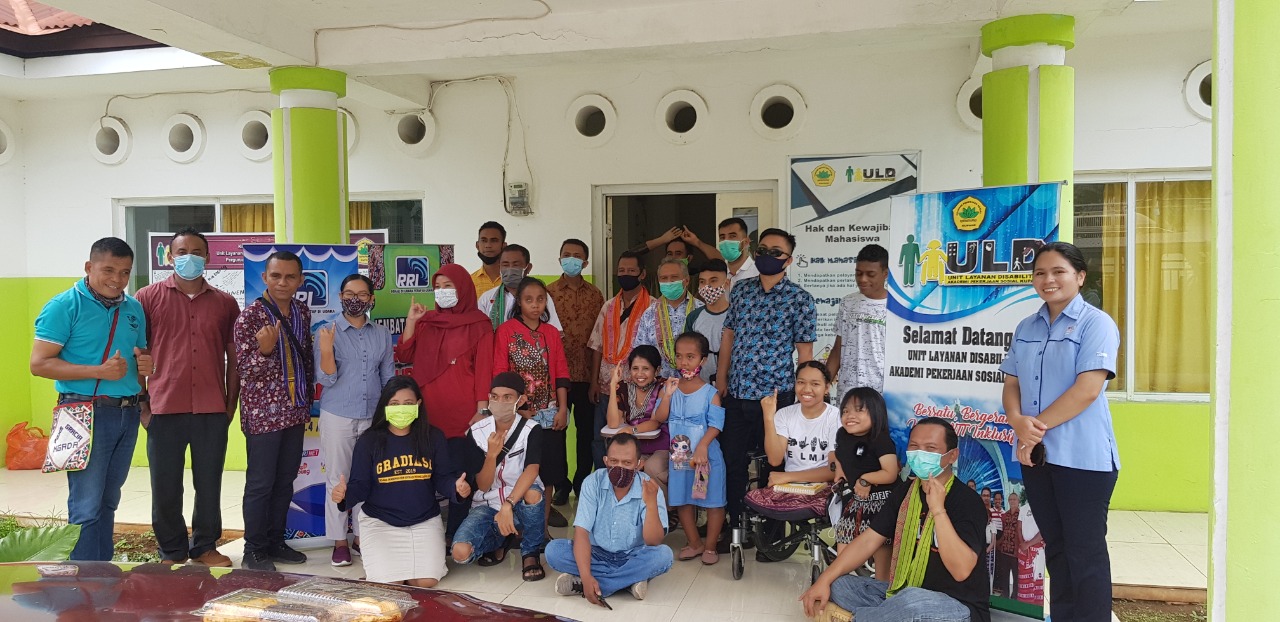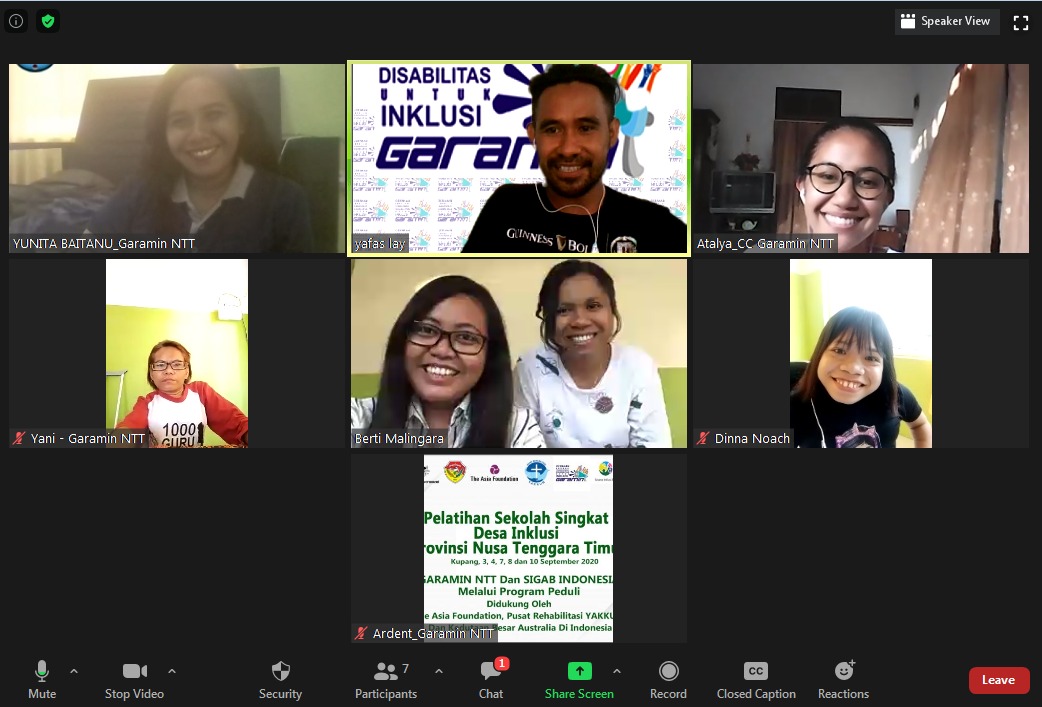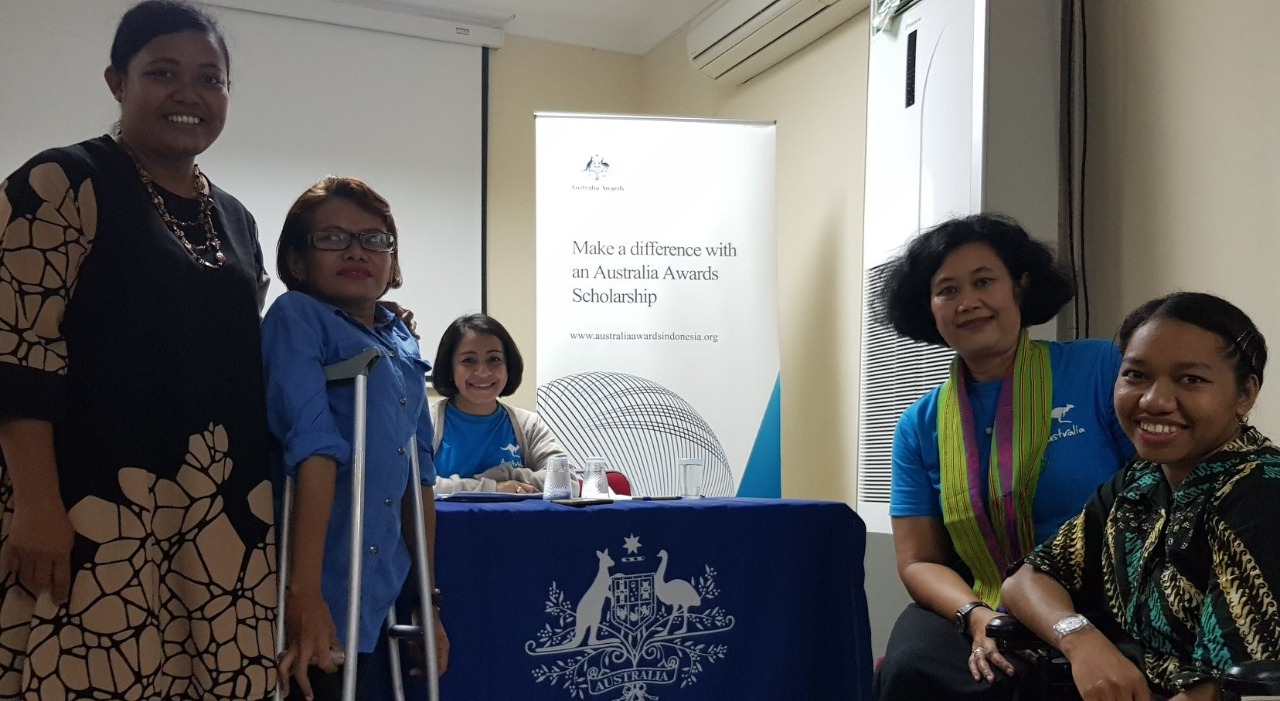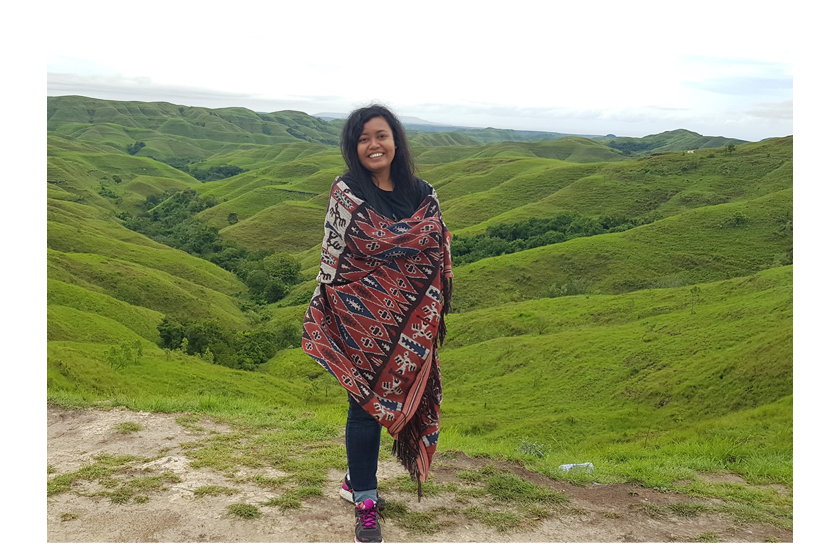In many emerging economies, including Indonesia, restrictions to prevent the spread of COVID-19 such as physical distancing and stay-at-home orders, threaten to aggravate exclusion and isolation of people with disabilities in nearly all facets of their life.
A rapid assessment by a network of Disabled People’s Organisations (DPO's) released in June 2020 showed the impact physical distancing and social restrictions had on various informal sector jobs, where most people with disabilities work. Although 86% of workers had lost between 50% and 80% of their income, less than 20% had received any kind of government aid. The rapid assessment report was initiated by disability rights advocates across Indonesia, coordinated by Sasana Inklusi dan Gerakan Advokasi Difabel (SIGAB), supported by Australia Indonesia Partnership for Justice.
"It is challenging, for example, for people who have vision impairment or people with disabilities who need assistance, they need someone to guide them when they leave their house. But people are told to keep their distance" said Berti Soli Dima Malingara co-founder of Gerakan Advokasi Transformasi Disabilitas Untuk Inklusi (GARAMIN), a non-government organisation focused on disability rights in East Nusa Tenggara (NTT) province.
Providing a voice for people with disabilities in government COVID-19 responses is the main challenge for Berti and her colleagues at GARAMIN. GARAMIN was founded in February 2020, less than a month before the NTT Provincial Government imposed the stay-at-home orders to prevent the disease from spreading.
"No one could answer because they only thought about the general public," said Berti, who has a Master's degree in disability policy and practice from Flinders University.
Early on, in April 2020, Berti and her colleagues created a WhatsApp group, called "Tanggap Covid-19 NTT Inklusif” (NTT Inclusive COVID-19 Response). The group serves as a forum to exchange information and alerts with parties who share concerns about people with disability being excluded from the government’s response.
Members of the group include individuals with disabilities and representatives from DPOs, local and international non-government organisations (NGOs), media, universities, and the local governments across the Timor, Flores and Sumba islands.
To get a clear picture of the condition of people with disabilities in NTT during the pandemic, Berti decided to take part in a rapid national assessment of the impact of COVID-19 on people with disabilities. As the coordinator for NTT, Berti managed the survey volunteers. She initially heard about the assessment through "Webkusi," a network of DPO's and disability activists, some of whom are Australia Awards alumni.
Social media and local NGO networks were used to share the survey. As many respondents did not have sufficient mobile phone credit, Berti would call them by phone and help them fill the survey in.
"What I found incredible about the survey was it developed a sense of solidarity among people with disabilities. One of my friends, who doesn't have hands, went door-to-door to interview people with disabilities who didn't have phone credit or internet access," she said.
The survey for NTT showed 43% of 205 respondents had lost up to 80% of their income within a month after the pandemic hit. As many as 95% suffered from complex financial difficulties, such as having difficulties buying food or paying for school due to the drop in income. Only 6% of the respondents had received cash aid.
"Many people with disabilities here are not aware of government aid because information platforms are inaccessible.” Berti said. “For example, information on COVID-19 aid was distributed in a paper circular at that time, whereas mobile vans with loud-speakers would be more accessible for blind people".
When the provincial government live-streamed a press conference on Facebook, there were no sign language interpreters for deaf people.
Inclusive Webinars
To overcome a restriction on gatherings, Berti started a series of webinars. Supported by the "Tanggap Covid-19 NTT Inklusif" network, the webinars aimed to raise awareness about the inclusion of people with disabilities in the provincial government's COVID-19 policies.
Issues that were discussed through the webinars included the importance of having data covering people with disabilities for COVID-19 responses to promoting scholarships for people with disabilities during the pandemic. She featured speakers and moderators from DPOs. Sign language interpreters and closed captions were used for people with hearing impairments.
Her efforts started to bear fruit. The provincial government deployed mobile vans to give education about COVID-19 in Kupang municipality. When the local government live-streamed a press conference through Facebook, it had a sign language interpreter.
"People with disabilities are now getting attention from the provincial government. The provincial social welfare office has started sending their staff to monitor implementation in Kupang Municipality," said Berti, who is a member of the Australia Indonesia Disability Advocacy Network (AIDRAN).
Berti's interest in disability inclusion and empowerment started in 2010 when she worked as a village facilitator for a maternal and neonatal health program in Oesena and Oelomin villages in Kupang district.
While living in the villages, she saw parents with children who had disabilities were not taking them to the integrated health service post (Posyandu) to get treatment or enrolling them in schools. There was a traditional belief that children or people with disabilities were cursed.
With advice from her office, she started a project to educate village officials and health post volunteers about the basic rights of children with disabilities, including education and health services.
Seeing the death of two children with disabilities whom she had previously helped to get treatment was a turning point for Berti to become an advocate. She even got her nickname "Nona Difabel" or "Miss Disabilities" during her time as a volunteer advocate in in East Sumba.
Berti gained further experience in inclusion activities on campus and in the community while studying in Australia from 2018 to 2019.
"The system (at Flinders) is beneficial for students with disabilities from the moment they register at the campus. The campus provides many conveniences, such as training for blind students, extra time to do tasks, tutors, and counselling services," she said.
While she is not a person with a disability, Berti was voted as secretary of Flinders University Students with Disability Association (FUSDA). One of its activities was attending Adelaide City's administration meetings to give input about accessibility and inclusion from international students’ perspectives.
In 2020, Berti also set up a disability service unit for students at Akademi Pekerjaan Sosial Kupang (Kupang Social Work Academy) a campus in Kupang. The move was inspired by her time in FUSDA, experience from joining Young Disability Advocates Trainers (YDAT) and visiting Pusat Layanan Studi Disabilities (PSLD), a disability resource centre at the University of Brawijaya, in Malang, East Java. Berti also received support from an Australian Awards alumni from Flinders University to set up the unit.
Two GARAMIN founders – one who has an intellectual disability and no palm on one hand, and the other who is a double amputee – were studying at the campus. They told her that they had trouble going to the restroom when they were on campus because the school is not accessible for students with disabilities.
"The lecturers don't know how to interact with students with disabilities," Berti said.
The campus accepted the proposal and even gave her an office. Berti hopes a similar approach will be replicated on other campuses in NTT.
But GARAMIN's primary goal is mainstreaming inclusive policy for people with disabilities through all government offices. To achieve this GARAMIN is collecting data on organisations that support people with disablities. The data is expected to be ready before NTT Provincial Government holds its next Regional Development Forum (Musrenbang).
"Hopefully, the provincial government can partner with organisations that are not always heard from,” Berti said. “The fight for inclusivity should be done by everyone, not just people with disabilities fighting alone.”
Berti is an unstoppable force. Earlier in April, the tropical cyclone Seroja swept through East Nusa Tenggara, West Nusa Tenggara and neighboring country East Timor, triggering massive flooding and landslides. Berti’s home was affected. The cyclone had torn off a part of Berti’s roof. Yet, she determined to help friends with disabilities whose homes were badly affected by visiting house to house to assess the damages. She also collaborated with numerous networks to gather data of people with disabilities in NTT province, and found at least 195 were affected by the disaster.
“The fight for inclusivity should be done by everyone, not just people with disabilities fighting alone,” said Berti. “We also need to awaken the spirit of young people with disabilities to support other friends with disabilities. A little less talk and a lot more action.”





 Berti Soli Dima Malingara Fights for Inclusion of People with Disabilities in COVID-19 Responses
Berti Soli Dima Malingara Fights for Inclusion of People with Disabilities in COVID-19 Responses
